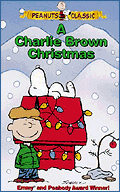How A Charlie Brown Christmas Came to Pass

The unlikely beginnings of a holiday classic
 "There will always be an audience for innocence in this country." Peanuts Holiday Specials
Related Links |
The first of nearly 50 Peanuts television movies, A Charlie Brown Christmas is the longest-running cartoon special in history, airing every year since its debut in 1965. Whimsical, melancholy, and ultimately full of wonder, it is a holiday favorite for countless families. But this cartoon classic almost didn't make it on the air.
A Movie No One Wanted
In 1963 producer Lee Mendelson made a short documentary about Charles Schulz called A Boy Named Charlie Brown. It included a few minutes of animated Peanuts scenes by Bill Melendez, who had animated the kids for a series of Ford Motor commercials, and music by jazz pianist Vince Guaraldi. Sadly, no television network wanted to air it.
But in 1965, after the Peanuts made the cover of TIME magazine, an advertising agent for the Coca-Cola company who had seen the Schulz documentary called Mendelson. The agent asked if Mendelson had thought about creating a Peanuts Christmas special. Mendelson fibbed that he had; the following day, he and Schulz came up with the story.
The Wise Men Meet
The basics of the cartoon were laid out within a few hours. It would include ice-skating; a pageant (Mendelson and Schulz had both flubbed parts in school shows); a mix of Christmas carols and Guaraldi's contemporary jazz; and the message that Christmas is really about the joyful miracle of Jesus's birth.
Schulz wanted A Charlie Brown Christmas to have the religious meaning that was central to his own experience of Christmas. And though the special was made in California, Schulz wanted it to include snowy scenes that recalled his native Midwest.
Christmas Critics
Even Schulz admitted that he was probably the only person who could have gotten A Charlie Brown Christmas made. Television executives hated it from the start.
It was criticized as being too religious—Linus quotes straight from the King James Bible (Luke 2:8-14). It was criticized for featuring contemporary jazz, an offbeat choice for a cartoon. It was criticized for not having a laugh track. It was criticized for using the voices of real children (except for Snoopy, who was voiced by animator Melendez).
O Happy Night
But it was an instant hit with viewers and reviewers alike.
On Thursday, December 9, 1965, A Charlie Brown Christmas was seen in more than 15 million homes, capturing nearly half of the possible audience. That week it was number two in the ratings, after Bonanza. It won critical acclaim as well as an Emmy Award for Outstanding Children's Program and a Peabody Award for excellence in programming.
Lost Footage
Unless you've watched A Charlie Brown Christmas from the get-go, you haven't seen the whole show. Coca-Cola, its first sponsor, had left its mark—or rather its logo, which appeared several times. For instance, in the skating scene, Snoopy throws Linus from the rink into a Coca-Cola sign (did you ever wonder where Linus lands?). Later sponsors objected, and the frames were edited out.
Several minutes' worth of footage was also clipped to allow more time for commercials, though some has been restored. Until 1997, the scene in which the Peanuts throw snowballs at a can on a fence was missing from both broadcast and video versions.







